Disclosure: Meeple Mountain received a free copy of this product in exchange for an honest, unbiased review. This review is not intended to be an endorsement.
Despite my love of the music born of the original vinyl era, I just don’t have money for a vinyl collection. No, that money is reserved for books and board games. Thankfully, the fine folks at Talon Strikes Studios have seen the possibility of such a disconnect in humanity and decided that someone like me might be more likely to spend money on a game about vinyl than I would be with actual vinyl.
Designer Eric Alvarado brought his original Vinyl concept to Kickstarter in 2018 with success. The original set collection game had several expansions that punned on various genres and gave the game a more personal style. Most recently, the Big Band expansion added yet one more flavor to the collection.
Vinyl: Jukebox—crowdfunded alongside Big Band—is an adjacent title, a two-player bag-building, coin-dropping race to assemble the best collection of records. The verbal puns are out, but there’s enough Jake Blues in there to know the personality lives on.
Sleeve
Duelists sit as jukebox owners, collecting the coins of their patrons, which also seem to function like wishes in a well. Each coin bears the markings of the sorts of records they might like to see in the machine: genre, decade, and relative obscurity (A-side/B-side). These coins are shoved in a bag, used and reused until they arrive at the right combination to buy that vaguely Presleyan-looking B-side from the 1960s that perfectly rounds out the collection.
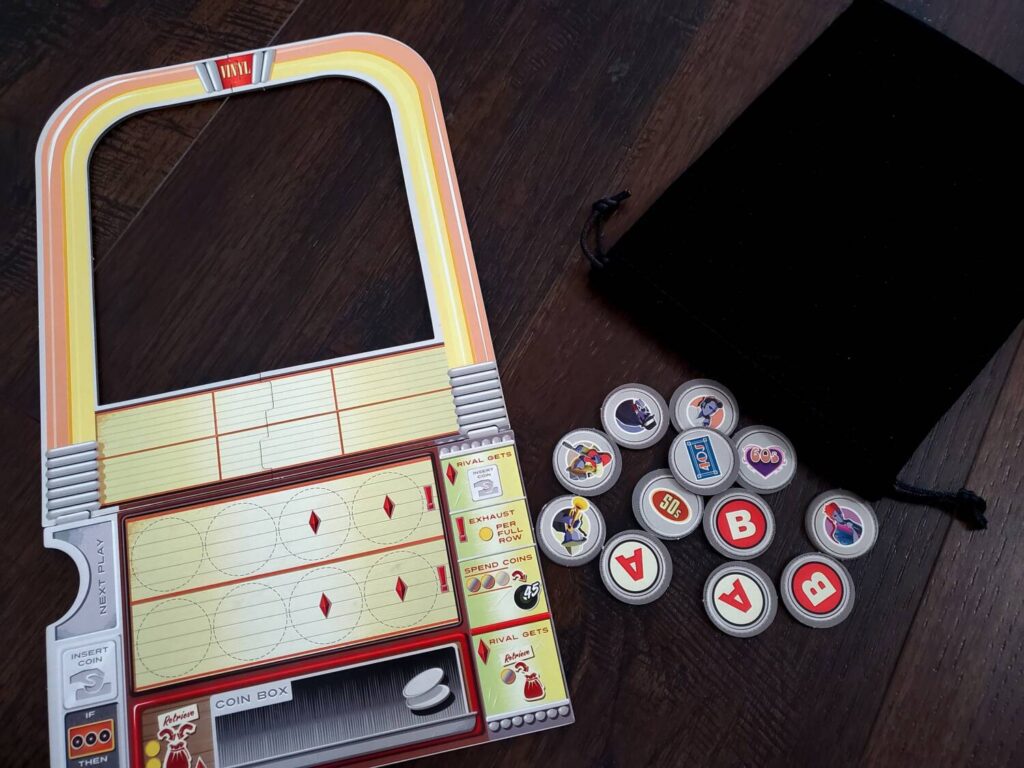
The player board is a jukebox with a cutout for the selection window which will hold a 3×3 arrangement of vinyl by the game’s end. The bottom half of the board holds two rows of four coins and a coin box, the last stop before heading back to the bag. The bag has a dozen silver coin tokens to start, but several more golden tokens with two icons each sit in the middle of the table. Also occupying the center is a 3×3 market of vinyl and an arrangement of bonus tiles players earn by collecting the right combinations in rows and columns.
Players pull coins from the bag, placing them into slots in the two rows, forming two purses of a sort. They can stop any time. Duplicate icons stack on top of one another. Players can deposit one unwanted coin in a special “next play” slot that returns to the bag, but the goal is to finish with a combination of icons that will purchase a slick new vinyl from the market to place in the jukebox.
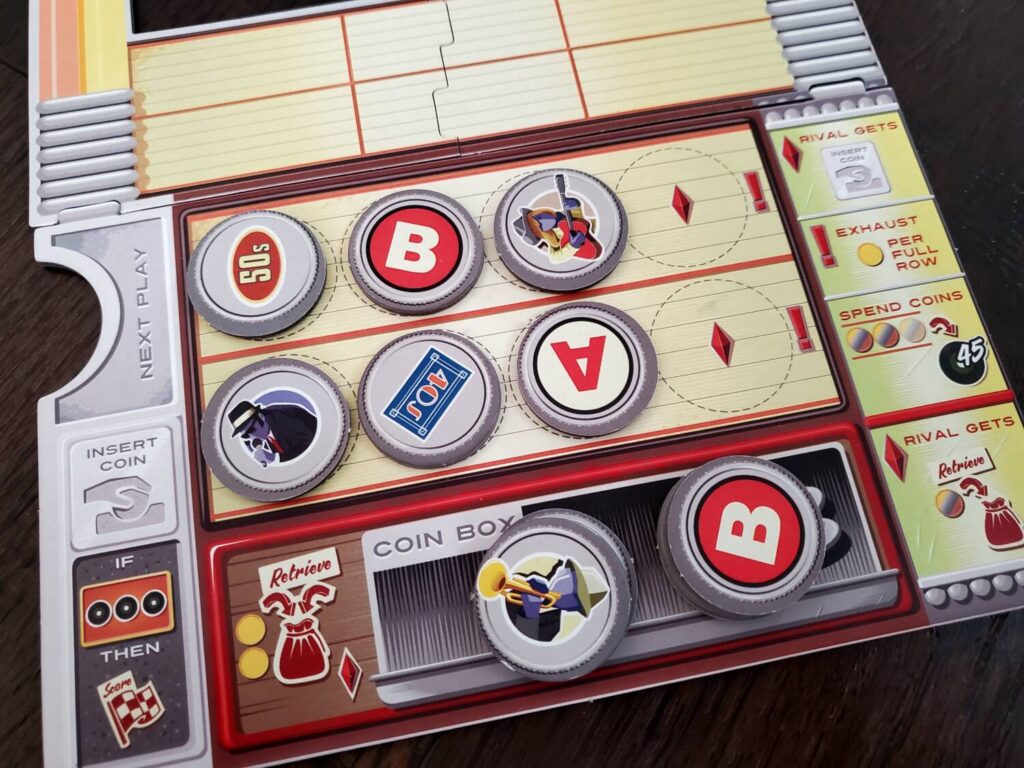
If no such combination is reached, the coins remain until the next turn. In the case of total disappointment, full rows can be dropped into the coin box at the end of the turn. This action adds one of the versatile gold coins to the player’s bag, which are always chosen from the face-up pool.
Adding just a hint of tension to the process, certain actions bless the other player, too. Four of each player’s slots, when covered, allow the opponent to pull a coin for their machine. When the time comes to empty the coin box—the obligatory maintenance turn of the bag-building genre—the active player takes up to two gold coins from the pool and the opponent puts one coin from their own coin box back into their bag. These little touches keep everyone in motion.
As players start to fill that 3×3 grid, every completed row and/or column scores a bonus token, which grants points for certain icons in the row. If you snagged three 45s from the 1940s in one row, for example, you could claim that bonus token (or one of lesser value if strategically appropriate). Or if you had two Punk records, there might be a matching token among the randomly chosen lot. There are two randomly chosen tokens for each attribute in the game. When a player first claims an attribute’s bonus, the opponent gets a coin for that attribute in their bag, making it more likely they’ll grab the other later.
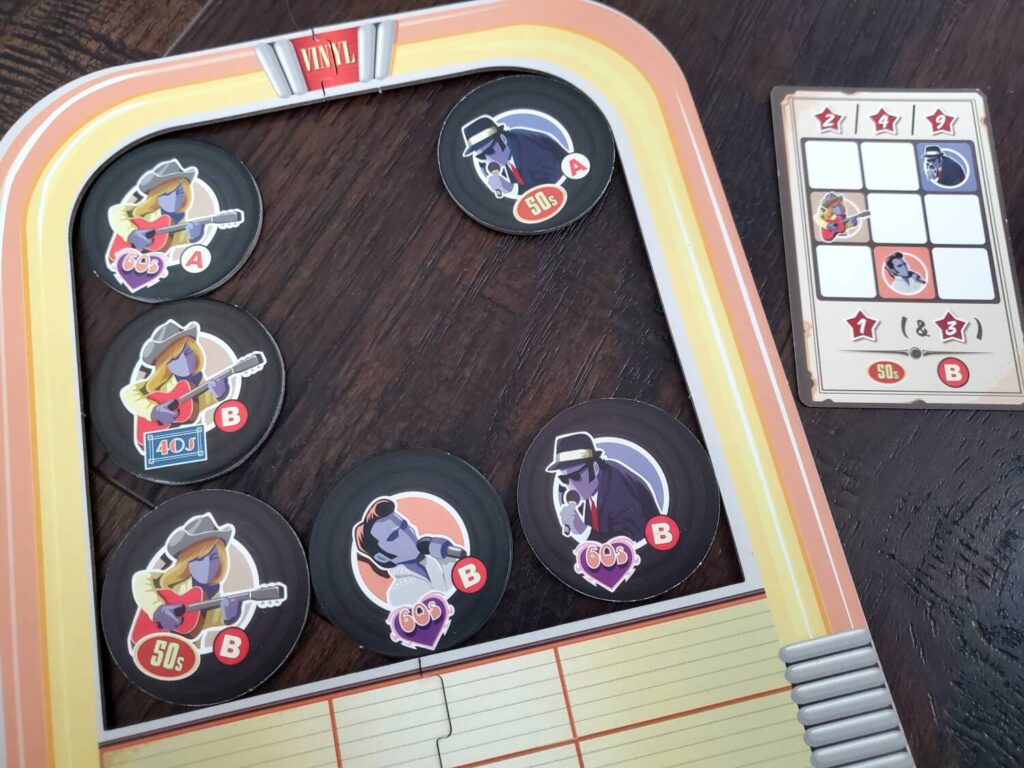
When the 3×3 grid is full, the game ends. The player who failed to complete their jukebox gets to scour the remaining bonus tokens to claim any matches for their incomplete rows. In this way, even a slower player might grab a solid set of points before the end. In addition, each player is chasing a particular vinyl configuration from a unique scoring card that also contains two preferred icons to personalize the scoring effort. This scoring card, along with the bonus tokens, form a player’s final score.
Sleeve Notes
For all the Quacks of Quedlinburg lovers out there, this ain’t that sort of bag building. Luck is not really pushed, and the jukebox never explodes. Vinyl: Jukebox is more akin to a game like Altiplano, albeit much, much lighter. There are so many available spots, a roughly known landscape of potential options, and a brief brush with destiny. The key to the game is laying out the grooves so your bag delivers in good time.
My favorite mechanic, which I’ve not even mentioned yet, is that the golden coins go back to the pool when they are spent on vinyl. One of the delights of bag and deck building is the creativity in managing unwanted or useless tokens. The jukebox duel is kept in balance by this little gem. Spite drafting a coin to keep it from the other player means it will stay in your way forever—so when you make a selection, you’d better mean it. Hoarding a few coins to bolster your angles on the Country scene is fine, but eventually you’ll have all the Willie Nelson you can handle, so you have to make sure you aren’t hampered by the wrong coins late. At the same time, grabbing only one might mean you can’t get to the right record first. This is probably the most enjoyable contemplation in the game.
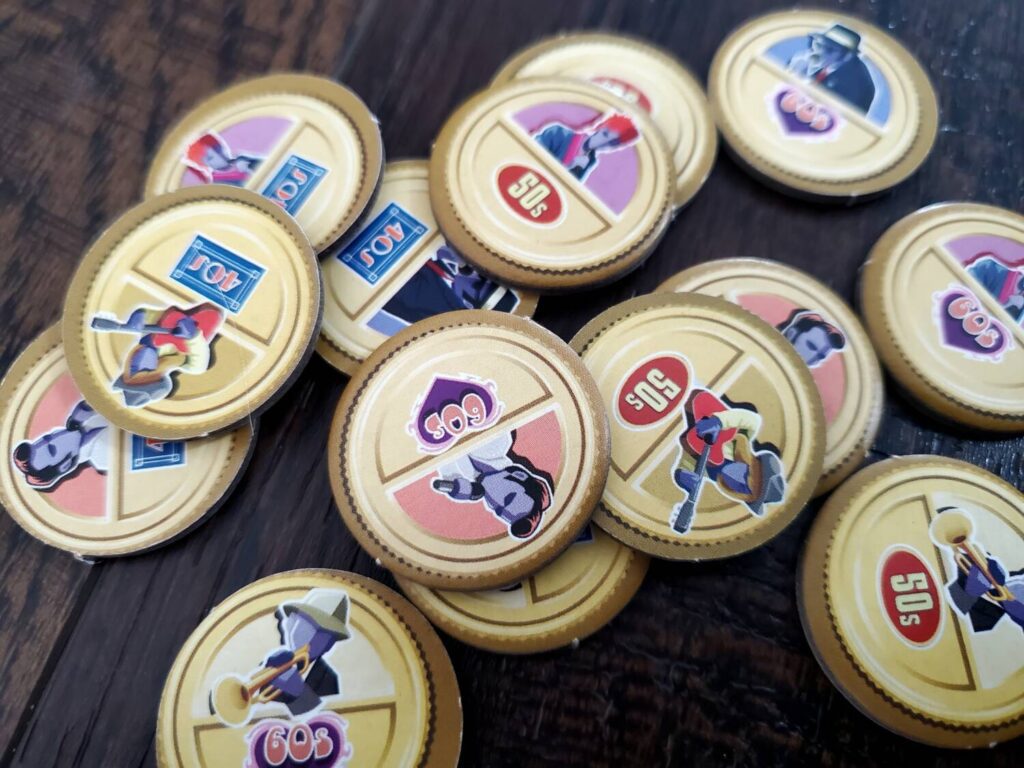
Another interesting balance is in knowing how to manage two rows of tokens with only one fluff spot to burn. There are times you drop eight coins into place (allowing/forcing your opponent to draw four as well) and find you could buy multiple 45s. There are other times you find yourself calculating what’s left in the bag to see if you should fill the rows and cash out for two juicy golden coins and a guarantee of success next turn. Because the game is a race to nine records, the decisions matter.
And yet, Vinyl: Jukebox is not what I would call thrilling. Quite the opposite, actually. It is extremely friendly. Sending your opponent to the bag helps more than it hurts. Emptying the coin box gives them something they might need. Heck, winning the race might give them two or even three bonus tokens they would not otherwise have earned the right to claim—except they would have if you hadn’t gone so fast.
I think this one would be a great option for a bit of music, a glass of wine or a tall milkshake, and a game full of conversation about the day. Nothing hurts my brain. Nothing hurts anyone’s feelings—well, almost.
I first played with my 10-year-old son. He was dejected throughout the game because dear-ol’ Dad was a lap or two ahead by the home stretch. I had just grabbed what I believed were the most lucrative bonuses along the way, giving no attention to his board. We reached the end and, as it turned out, some of the “lesser” bonuses were pretty valuable. If I really wanted to pulverize my boy, I would have taken the lesser bonuses because he didn’t have the goods to claim the prime pickins’ at the end. My choices worked, I guess, because I still won and he still wanted to play again…because Vinyl: Jukebox is “friendly.”
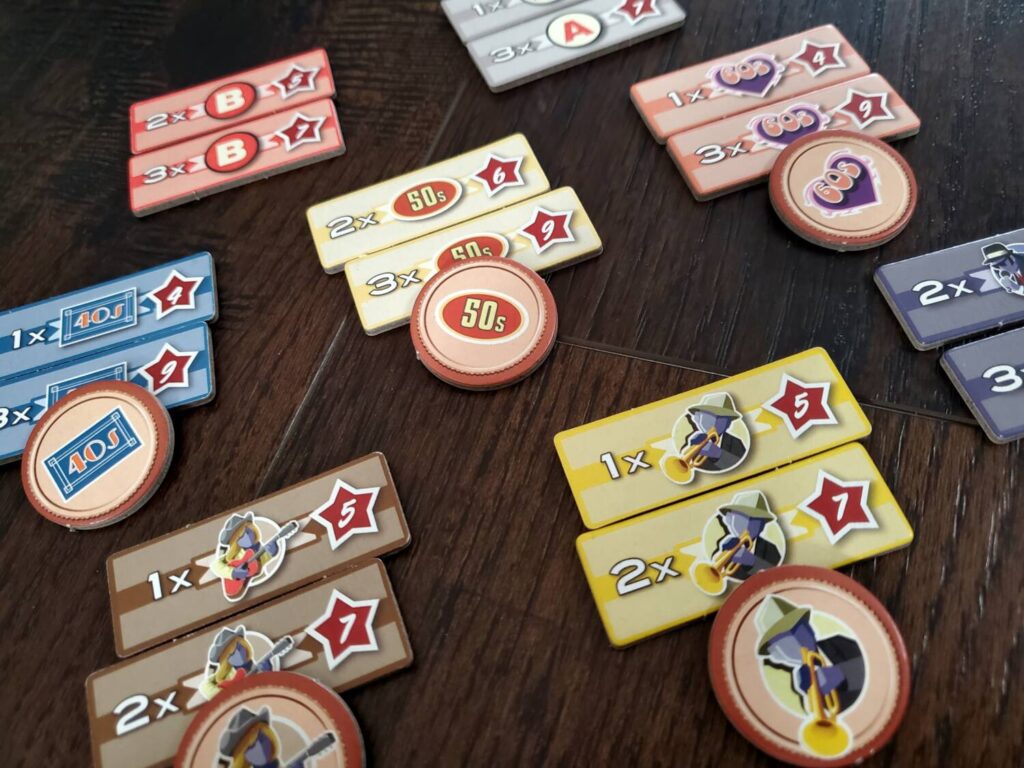
But who wouldn’t love a cutthroat ending to a chill date night? Go ahead, take that lesser bonus token from your wife and watch her face when she realizes she can’t score that row. It’ll be romantic. Trust me.
From the Kickstarter campaign page to the finished product, the jukebox got a fruitful facelift. I love the machine’s king-sized look on the table. The oddly familiar icons on the vinyl are easy to read and fit the overall ethos of the game quite well. The setup is rather hands on: there are tokens to sort, coins to flip, and vinyl to shuffle before this one can get under way. But once it’s on the table, everything is within reach and the game length matches the complexity. Just brace yourself for a horribly organized rulebook.
I’ve not played any of the earlier Vinyl titles (though I have a copy of the Holiday Edition for review), but I’m pleased with the duel. There are plenty of two-player affairs that are deeper, wider, and more explosive, but Jukebox sits comfortably in its pocket and delivers. It gives me the same vibes I got from Speakeasy Blues: it communicates an era, a particular sort of good time. It’s a reason to indulge the medium and setting it celebrates while still having enough headspace for the music.
If you’re into the concept, you might find you enjoy it.


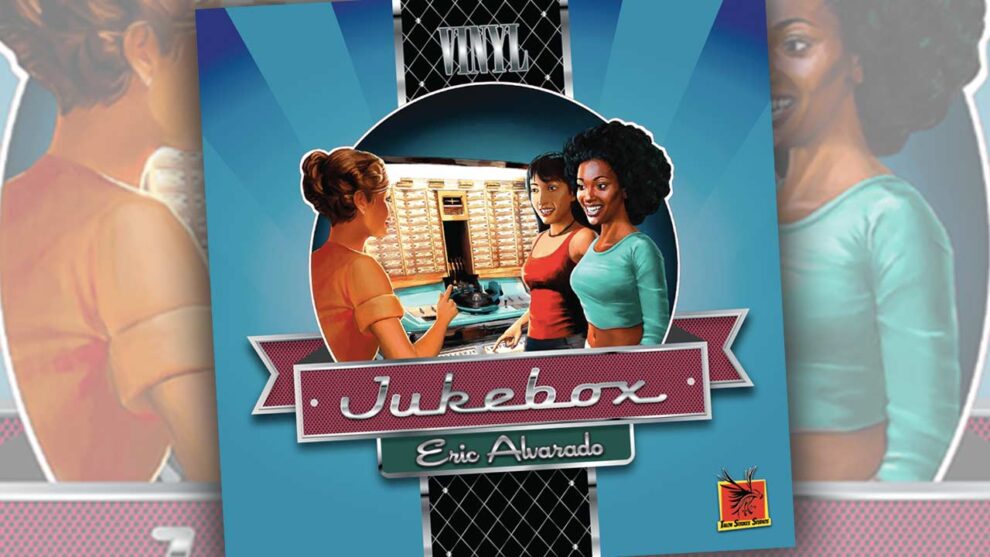









Add Comment